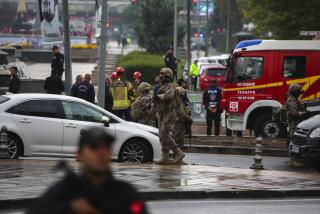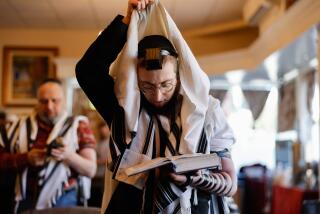A Deadly Alliance Forged in Hometown
- Share via
BINGOL, Turkey — Mesut Cabuk grew up reclusive and angry, people who knew him here recall. In the decade before he blew up Istanbul’s largest synagogue, he made several secretive trips to Pakistan, authorities said.
His associate, Azad Ekinci, went on trips too. “Each time he came back sounding more militant, religious and anti-Western than in the past,” a relative said.
Ekinci has been identified as one of two suicide bombers who attacked the British Consulate and a crowded British-owned bank Thursday in Istanbul. The blasts came five days after the suicide bombings of two synagogues in the city that authorities said were carried out by Cabuk and an acquaintance. More than 50 people were killed in the four blasts.
Gokhan Elaltuntas, identified as the second synagogue bomber, was not extraordinarily pious. But he began to change as he associated more and more with the other two men, said a close friend here in Bingol. “Gokhan was crazy about hunting,” said Murat Aybek, the friend. “He was a very good shot.”
As nine more people were indicted Tuesday in last week’s blasts, the portrait emerging of the four ethnic Kurdish men who allegedly inflicted on Turkey its worst carnage in many years is a familiar one, one that fits the pattern of young Muslim men attracted from all over the world to learn and train in Pakistan, Afghanistan and similar radical venues. Many became fighters in a loose network, some with ties to Al Qaeda and some unconnected but espousing the same extreme line.
Three of the four suspected suicide bombers came from Bingol, an Islamist stronghold in the Kurdish region of southeastern Turkey. It is a hardscrabble city of 200,000, with many mosques and madrasas, or Koranic schools, and where women cover themselves.
Set amid rough mountains prone to earthquakes, Bingol has long been a restive, unhappy place where poor Kurdish farmers raise sheep. Fifteen years of warfare between Turkish forces and Kurdish guerrillas only served to deepen the region’s mistrust of central authority.
The isolation also helped nurture a strain of Islamic extremism and a number of radical, violent groups.
The three Bingol men have been linked to Hezbollah, an extremist militia that was largely created by the Turkish military and government in the 1980s to fight Kurdish rebels known as the Kurdish Workers Party, or PKK.
The state, in effect, used Kurds to battle Kurds, turning a blind eye to the extremist nature of Hezbollah because it could serve as the proxy army unleashed on the PKK. (Turkish Hezbollah is not related to other organizations with the same name in Lebanon and elsewhere.)
Once the Kurdish insurrection was largely put down, Hezbollah was no longer needed. State security forces conducted raids on a string of Hezbollah safe houses in 2000 and killed top commander Huseyin Velioglu.
But the remnants might have been preparing already for the next fight, Turkish analysts say. Throughout the last decade, hundreds of Turks trained or fought in Bosnia-Herzegovina, Chechnya and Pakistan, then returned to their homeland. Experts believe that, at a minimum, the fighters provided transit in Turkey for Arab extremists or may have been forming cells that sprang into action this month.
“They could have formed cells,” said Hasan Koni, an advisor to the National Security Council. “All it takes is one phone call. Look at Turkey’s neighbors. It’s so easy to smuggle almost anything across the border from Iran or Iraq.”
In Bingol, police reportedly have seized the computers at an Internet cafe managed by Elaltuntas and reviewed the hard disks. The cafe was a popular gathering place in the bleak and conservative town.
Members of Elaltuntas’ family, like most of the few people here who would speak to reporters, were in shock over his reported involvement in the bombings. Police have conducted tests on DNA from flesh found in the truck bombs and compared the samples with some from his Bingol relatives.
“Gokhan was supposed to be getting married” Dec. 12, said his uncle, Serif. “He was an optimist, attached to life. He was a calm, steady person. He would never get involved in terrorism.”
But his friend, Aybek, said Elaltuntas, 22, changed after associating with Cabuk and Ekinci.
“He was pious but not overly so,” Aybek recalled. Later, “he became a different person.”
Those who knew Cabuk recalled him as an especially surly person who lost his mother at age 8 and then so hated his stepmother that he lived with other relatives.
“He was extremely antisocial, very reclusive and seemed deeply unhappy,” said a teacher, who asked not to be named.
Police sources in Bingol said Cabuk, 29, had traveled to Pakistan several times. Tattered scraps of his passport were found at the site of one of the bombings.
Relatives said Ekinci also traveled abroad quite a bit, especially to Dubai in the United Arab Emirates. They said they knew he was involved in Hezbollah and was very secretive.
Elaltuntas is not known to have traveled outside Turkey. After an earthquake in May that killed more than 160 people in Bingol, he left town with Cabuk and Ekinci and headed for Istanbul.
Police have told Turkish media that two of the men used fake IDs to purchase the four trucks used in the bombings. The explosives, a mix of fertilizer and oil, would have been easy to obtain.
The nine people charged Tuesday as accomplices in the attack on the British sites reportedly included people from Bingol. Six people were charged earlier in connection with the synagogue bombings.
Prime Minister Recep Tayyip Erdogan called on fellow Muslims to use this week’s Eid al-Fitr holiday marking the end of the holy month of Ramadan to reflect on how their faith had been used to foment tragedy.
“It seems to me that those who link our holy beliefs to terrorism are gaining ground even among our people, very slowly and gradually, like water drops making a hole in stone,” Erdogan said at a breakfast marking the end of Ramadan fasting.
“This bothers me. I cannot stand it when I hear the phrase Islamic terrorism,” he said. “God willing, terrorism will not be able to grow on the soil that has been the cradle of many civilizations.”
Times staff writer Tracy Wilkinson in Rome and special correspondent Amberin Zaman in Istanbul contributed to this report.
More to Read
Sign up for Essential California
The most important California stories and recommendations in your inbox every morning.
You may occasionally receive promotional content from the Los Angeles Times.










